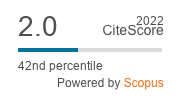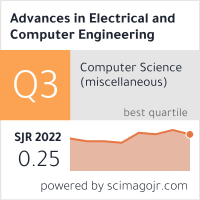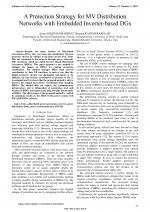| 3/2022 - 3 |
A Protection Strategy for MV Distribution Networks with Embedded Inverter-based DGsSOLEIMANISARDOO, A. |
| View the paper record and citations in |
| Click to see author's profile in |
| Download PDF |
Author keywords
distributed power generation, inverter, power distribution faults, power system protection, PSCAD
References keywords
power(24), protection(17), distributed(15), generation(13), distribution(12), inverter(10), systems(9), energy(9), fault(8), scheme(7)
Blue keywords are present in both the references section and the paper title.
About this article
Date of Publication: 2022-08-31
Volume 22, Issue 3, Year 2022, On page(s): 25 - 32
ISSN: 1582-7445, e-ISSN: 1844-7600
Digital Object Identifier: 10.4316/AECE.2022.03003
Web of Science Accession Number: 000861021000003
SCOPUS ID: 85137694601
Abstract
Despite the many benefits of Distributed Generations (DGs), they can cause mis-coordination between protective devices by changes in the fault current level. Many DGs are connected to the network through power electronic (PE) interfaces, which are called Inverter Based Distributed Generators (IBDGs). This paper proposes a new method to mitigate the impact of IBDGs on existing protection coordination. The method manages IBDG fault current contribution by their PE interfaces in such a way that the digital protective devices can distinguish and ignore it. In addition, the fuse-recloser coordination in presence of DG is investigated and it is shown that the proposed method is able to preserve the original fuse-recloser coordination after installing IBDGs. The method does not require any communication infrastructure and is independent of penetration level and location of IBDGs and supports the plug and play functionality of IBDGs. The effectiveness of the proposed method is verified by simulation results on the IEEE 33-Bus power system with PSCAD/EMTDC software. |
| References | | | Cited By |
Web of Science® Times Cited: 0
View record in Web of Science® [View]
View Related Records® [View]
Updated today
SCOPUS® Times Cited: 0
View record in SCOPUS® [Free preview]
There are no citing papers in the CrossRef Cited-by Linking system.
Disclaimer: All information displayed above was retrieved by using remote connections to respective databases. For the best user experience, we update all data by using background processes, and use caches in order to reduce the load on the servers we retrieve the information from. As we have no control on the availability of the database servers and sometimes the Internet connectivity may be affected, we do not guarantee the information is correct or complete. For the most accurate data, please always consult the database sites directly. Some external links require authentication or an institutional subscription.
Web of Science® is a registered trademark of Clarivate Analytics, Scopus® is a registered trademark of Elsevier B.V., other product names, company names, brand names, trademarks and logos are the property of their respective owners.
Faculty of Electrical Engineering and Computer Science
Stefan cel Mare University of Suceava, Romania
All rights reserved: Advances in Electrical and Computer Engineering is a registered trademark of the Stefan cel Mare University of Suceava. No part of this publication may be reproduced, stored in a retrieval system, photocopied, recorded or archived, without the written permission from the Editor. When authors submit their papers for publication, they agree that the copyright for their article be transferred to the Faculty of Electrical Engineering and Computer Science, Stefan cel Mare University of Suceava, Romania, if and only if the articles are accepted for publication. The copyright covers the exclusive rights to reproduce and distribute the article, including reprints and translations.
Permission for other use: The copyright owner's consent does not extend to copying for general distribution, for promotion, for creating new works, or for resale. Specific written permission must be obtained from the Editor for such copying. Direct linking to files hosted on this website is strictly prohibited.
Disclaimer: Whilst every effort is made by the publishers and editorial board to see that no inaccurate or misleading data, opinions or statements appear in this journal, they wish to make it clear that all information and opinions formulated in the articles, as well as linguistic accuracy, are the sole responsibility of the author.





